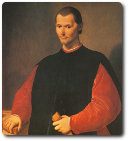The White Devil Contents
- Social / political context of The White Devil
- Religious / philosophical context of The White Devil
- The Theatre
Machiavellian corruption
The Machiavellian villain
 The ideas of Machiavelli had become influential in seventeenth century England, and they were often used as a reason to distrust everything that came from Italy. (See Religious / philosophical Context > The Renaissance in England > Advice on how to govern / the Renaissance prince.)
The ideas of Machiavelli had become influential in seventeenth century England, and they were often used as a reason to distrust everything that came from Italy. (See Religious / philosophical Context > The Renaissance in England > Advice on how to govern / the Renaissance prince.)
Machiavelli's ideas were epitomised in drama by the Machiavellian villain who would use subterfuge and devious methods rather than straightforward confrontation with his enemies to gain his ends. In The White Devil there are a number of characters who employ these tactics, but the chief among them is Francisco de Medici.
Francisco's Machiavellian tactics
It could be argued that there is some justification in what Francisco does. His sister has been murdered by her husband, Brachiano, and he wishes to avenge her death. However, it is the methods which he uses that show him to be a Machiavellian villain:
- Francisco's love of subterfuge is demonstrated when he persuades Monticelso to give him his ‘black book' containing the names of villains. He wishes to make use of the murderers listed in it for his devious purposes:
To point me out a list of murderers,
Agents for any villainy.
(Act 4 scene 1)
- In Act 4 scene 3 Francisco recruits Lodovico to his cause by devious means
- He then goes to Brachiano's court to spy on him disguised as Mulinassar, the Moor
- Brachiano is killed by poison administered in an ingenious way. Flamineo claims that Brachiano's death is the result of ‘the rare tricks of a Machiavellian' meaning Francisco is implicated.
All these underhand methods are evidence of Machiavellian plotting.
Pragmatism v. morality
Despite his claim to act on behalf of his murdered sister, Francisco is governed more by the sense of what is politically feasible than by a strong moral cause:
- Pragmatically, he will not directly attack Brachiano as he does not wish to harm his subjects by waging war:
Most burdensome on my poor subjects' necks ..?
(Act 4 scene 1)
- In Act 5 scene 3, when Lodovico claims that hearing of Flamineo's part in the murder of Camillo justifies their vengeance, Francisco denies that justice is significant. He claims that success is the only thing that matters, removing any moral justification for their actions:
What harms it justice? We, now, like the partridge,
Purge the disease with laurel, for the fame
Shall crown the enterprise and quit the shame.'
- In a final twist, Francisco leaves the scene before the final murders are committed by Lodovico and his fellow plotters. Consequently Francisco escapes his just retribution for the plot that he instigated.
The corrupt court
To a contemporary audience the portrayal of Francisco and his conspirators would underline the reputation of all Italian nobility as being involved in Machiavellian corruption. This impression is re-enforced by the court of Brachiano which exhibits similar Machiavellian characteristics:
- Brachiano kills his wife by having her poisoned in an ingenious manner
- Brachiano's secretary, Flamineo, shows himself willing to use underhand means to help his master and advance his own career. He persuades his own sister to succumb to the seduction of Brachiano and dupes her husband, Camillo, displaying his deviousness through asides as he does so.
